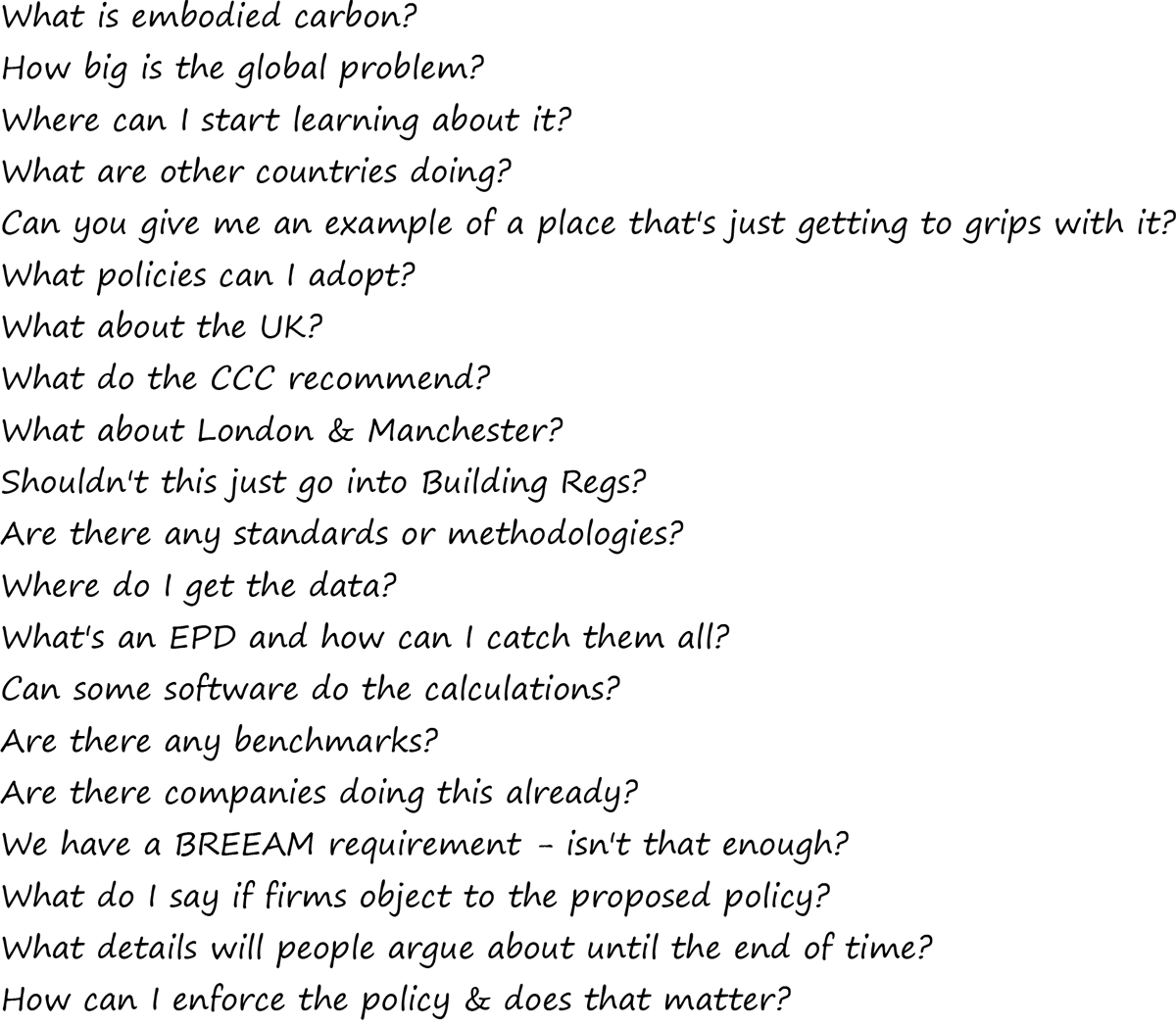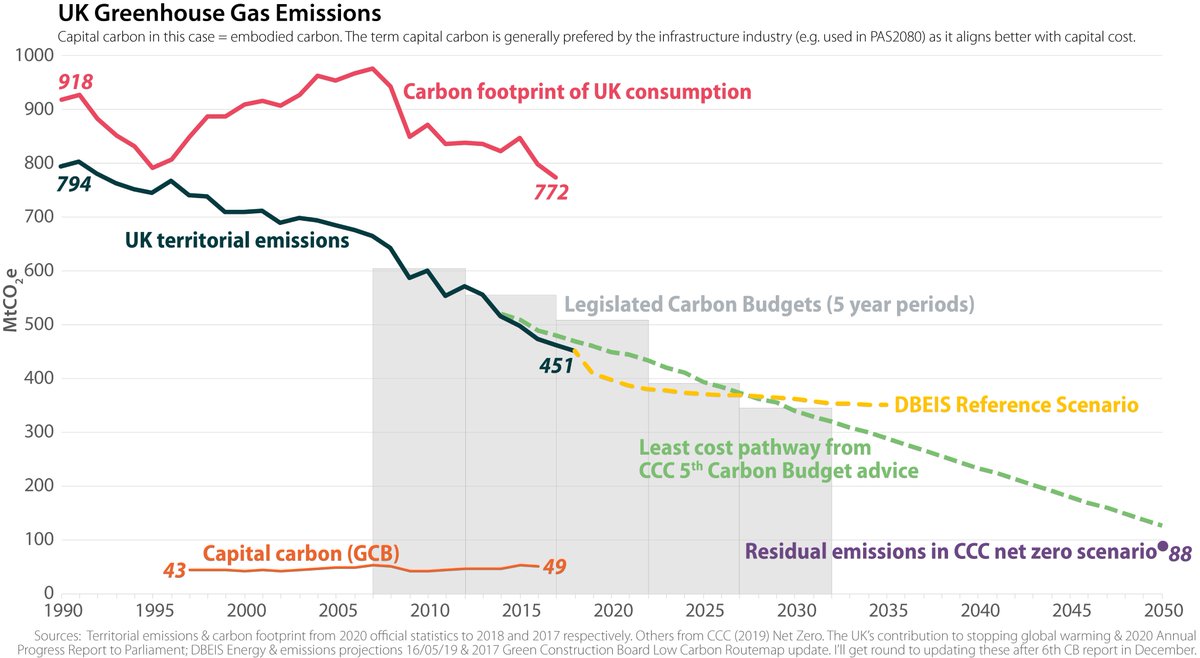I& #39;ve had several recent exchanges with local authorities who& #39;re interested in tackling embodied carbon in buildings but struggling to keep up with all the docs out there. So here& #39;s my & #39;20 questions about embodied carbon resources for local authorities& #39; public service mega thread.
Before we begin, remember this is Twitter, I have 280 characters not 280 pages - read the linked docs or email me if you want to discuss something in detail. If you DM me lots of tangentially related sustainability queries I probably won& #39;t respond unless you& #39;re @_B_Hopkins
For context, most UK local authorities have declared climate emergencies and set ambitious targets. Depending on what& #39;s being built in your area, embodied carbon (EC) can be a large and often unaccounted for share of the emissions influenced by LAs. https://www.climateemergency.uk/blog/list-of-councils/">https://www.climateemergency.uk/blog/list...
Say you& #39;re Leeds and you& #39;ve committed to a cumulative carbon budget of ~42 MtCO2e before you reach carbon neutrality. EC will be ~0.5-1 MtCO2e each year in your region and you have no policies in place to reduce it. What do you do? This thread is one very basic starting point
Get a coffee, I& #39;ll try and very briefly cover the following questions whilst linking to resources that can tell you a lot more.
What is embodied carbon?
EC is shorthand for emissions associated with materials and construction processes throughout the lifecycle of a built asset. These mostly occur near the start of a project, receive little attention and go largely unregulated. https://www.worldgbc.org/embodied-carbon ">https://www.worldgbc.org/embodied-...
EC is shorthand for emissions associated with materials and construction processes throughout the lifecycle of a built asset. These mostly occur near the start of a project, receive little attention and go largely unregulated. https://www.worldgbc.org/embodied-carbon ">https://www.worldgbc.org/embodied-...
How big is the global problem?
EC accounts for 11-20% of global emissions depending upon the estimate. This share will increase as we expect to double the global building stock in next few decades. @WorldGBC say we need to cut EC by ~40% by 2030 to be on track for Paris Agreement
EC accounts for 11-20% of global emissions depending upon the estimate. This share will increase as we expect to double the global building stock in next few decades. @WorldGBC say we need to cut EC by ~40% by 2030 to be on track for Paris Agreement
Where can I start learning about it?
The @LETI_London Embodied Carbon Primer is a good one stop resource. It covers key concepts, terms and methods for assessment alongside further design guidance and mitigation strategies https://www.leti.london/ecp ">https://www.leti.london/ecp"...
The @LETI_London Embodied Carbon Primer is a good one stop resource. It covers key concepts, terms and methods for assessment alongside further design guidance and mitigation strategies https://www.leti.london/ecp ">https://www.leti.london/ecp"...
There are also specific docs for different professions. e.g.
Architects: https://www.architecture.com/-/media/gathercontent/whole-life-carbon-assessment-for-architects/additional-documents/11241wholelifecarbonguidancev7pdf.pdf
Structural">https://www.architecture.com/-/media/g... Engineers: https://www.istructe.org/resources/guidance/how-to-calculate-embodied-carbon/
Surveyors:">https://www.istructe.org/resources... https://www.rics.org/globalassets/rics-website/media/news/whole-life-carbon-assessment-for-the--built-environment-november-2017.pdf
Clients:">https://www.rics.org/globalass... https://www.ukgbc.org/sites/default/files/UK-GBC%20EC%20Developing%20Client%20Brief.pdf
and">https://www.ukgbc.org/sites/def... many more...
Architects: https://www.architecture.com/-/media/gathercontent/whole-life-carbon-assessment-for-architects/additional-documents/11241wholelifecarbonguidancev7pdf.pdf
Structural">https://www.architecture.com/-/media/g... Engineers: https://www.istructe.org/resources/guidance/how-to-calculate-embodied-carbon/
Surveyors:">https://www.istructe.org/resources... https://www.rics.org/globalassets/rics-website/media/news/whole-life-carbon-assessment-for-the--built-environment-november-2017.pdf
Clients:">https://www.rics.org/globalass... https://www.ukgbc.org/sites/default/files/UK-GBC%20EC%20Developing%20Client%20Brief.pdf
and">https://www.ukgbc.org/sites/def... many more...
What are other countries doing?
Lots. The 2018 Bionova Embodied Carbon Review summarised 105 international systems with direct measures for embodied carbon. Even that is a bit out of date now. https://www.oneclicklca.com/embodied-carbon-review/">https://www.oneclicklca.com/embodied-...
Lots. The 2018 Bionova Embodied Carbon Review summarised 105 international systems with direct measures for embodied carbon. Even that is a bit out of date now. https://www.oneclicklca.com/embodied-carbon-review/">https://www.oneclicklca.com/embodied-...
For example, see p10 onwards in this report from March for @ZeroWasteScot summarising some more recent developments - again already out of date - more examples below https://zerowastescotland.org.uk/sites/default/files/Embodied_carbon_spreads%20final.pdf">https://zerowastescotland.org.uk/sites/def...
Can you give me an example of a place that& #39;s just getting to grips with it?
Sweden& #39;s National Board of Housing, Building and Planning is implementing legislation making climate declarations for new buildings mandatory by 2022. From 2027 they& #39;ll introduce limits values...
Sweden& #39;s National Board of Housing, Building and Planning is implementing legislation making climate declarations for new buildings mandatory by 2022. From 2027 they& #39;ll introduce limits values...
These will start at 20% less than a functionally equivalent building (using the data they gather in the first 5 years). There will then be further tightening of reduction requirements over time (up to 80% by 2043).
https://www.boverket.se/sv/om-boverket/publicerat-av-boverket/publikationer/2020/utveckling-av-regler-om-klimatdeklaration-av-byggnader/">https://www.boverket.se/sv/om-bov...
https://www.boverket.se/sv/om-boverket/publicerat-av-boverket/publikationer/2020/utveckling-av-regler-om-klimatdeklaration-av-byggnader/">https://www.boverket.se/sv/om-bov...
What policies can I adopt?
For LAs there& #39;s lots of options, from zoning & land use to building regs & financial incentives -see the handy @CarbnNtrlCities city policy framework which sets out 52 policy options for cities with example language & precedents https://www.embodiedcarbonpolicies.com/ ">https://www.embodiedcarbonpolicies.com/">...
For LAs there& #39;s lots of options, from zoning & land use to building regs & financial incentives -see the handy @CarbnNtrlCities city policy framework which sets out 52 policy options for cities with example language & precedents https://www.embodiedcarbonpolicies.com/ ">https://www.embodiedcarbonpolicies.com/">...
What& #39;s the status in UK?
Currently EC is ~50 MtCO2e/yr & is generally only assessed on a voluntary basis (e.g. where clients include requirements as part of their sustainability brief) or where required as part of an Environmental Statement (think major roads, rail schemes etc)
Currently EC is ~50 MtCO2e/yr & is generally only assessed on a voluntary basis (e.g. where clients include requirements as part of their sustainability brief) or where required as part of an Environmental Statement (think major roads, rail schemes etc)
What do the CCC recommend?
@theCCCuk have made specific recommendations upon supporting EC assessment & benchmarking to MHCLG & written some letters that appear to have been ignored. They even had AECOM prepare a report on policy options for the UK
https://www.theccc.org.uk/wp-content/uploads/2019/07/Options-for-incorporating-embodied-and-sequestered-carbon-into-the-building-standards-framework-AECOM.pdf">https://www.theccc.org.uk/wp-conten...
@theCCCuk have made specific recommendations upon supporting EC assessment & benchmarking to MHCLG & written some letters that appear to have been ignored. They even had AECOM prepare a report on policy options for the UK
https://www.theccc.org.uk/wp-content/uploads/2019/07/Options-for-incorporating-embodied-and-sequestered-carbon-into-the-building-standards-framework-AECOM.pdf">https://www.theccc.org.uk/wp-conten...
What about London & Manchester?
London are cracking on with introducing a 3 stage assessment process as part of new London Plan. The guidance, reporting template etc are out for consultation til Jan with final publication expected in first half of 2021. https://consult.london.gov.uk/whole-life-cycle-carbon-assessments">https://consult.london.gov.uk/whole-lif...
London are cracking on with introducing a 3 stage assessment process as part of new London Plan. The guidance, reporting template etc are out for consultation til Jan with final publication expected in first half of 2021. https://consult.london.gov.uk/whole-life-cycle-carbon-assessments">https://consult.london.gov.uk/whole-lif...
Manchester are taking a different approach in their new Spatial Framework - going to AGMA Committee tomorrow. Their definition for net zero carbon buildings will include net zero ‘in construction’ from 2028 onwards as per the UKGBC Framework Definition.
https://www.greatermanchester-ca.gov.uk/media/3663/221020-agma-issue-opt.pdf">https://www.greatermanchester-ca.gov.uk/media/366...
https://www.greatermanchester-ca.gov.uk/media/3663/221020-agma-issue-opt.pdf">https://www.greatermanchester-ca.gov.uk/media/366...
By the way, that net zero buildings framework sets out three different definitions for net zero that everyone should get familiar with and start using. @UKGBC have started exploring developing something similar for infrastructure https://www.ukgbc.org/ukgbc-work/net-zero-carbon-buildings-a-framework-definition/">https://www.ukgbc.org/ukgbc-wor...
Shouldn& #39;t this just go into Building Regs?
Arguably yes, but isn& #39;t likely to happen soon. There& #39;s been repeated calls for this for decade+ with specific past proposals rejected under now defunct policy frameworks like Zero Carbon Homes. Here& #39;s latest @mhclg response to @theCCCuk
Arguably yes, but isn& #39;t likely to happen soon. There& #39;s been repeated calls for this for decade+ with specific past proposals rejected under now defunct policy frameworks like Zero Carbon Homes. Here& #39;s latest @mhclg response to @theCCCuk
Are there any standards or methodologies?
Yes https://abs.twimg.com/emoji/v2/... draggable="false" alt="🇪🇺" title="Flagge der Europäischen Union" aria-label="Emoji: Flagge der Europäischen Union"> standards developed by CEN/TC350 (e.g. EN 15978, EN 15804) and other national documents that build on them (e.g. RICS PS). The GLA are building on top of these when introducing their reporting requirements.
https://abs.twimg.com/emoji/v2/... draggable="false" alt="🇪🇺" title="Flagge der Europäischen Union" aria-label="Emoji: Flagge der Europäischen Union"> standards developed by CEN/TC350 (e.g. EN 15978, EN 15804) and other national documents that build on them (e.g. RICS PS). The GLA are building on top of these when introducing their reporting requirements.
https://www.rics.org/globalassets/rics-website/media/news/whole-life-carbon-assessment-for-the--built-environment-november-2017.pdf">https://www.rics.org/globalass...
Yes
https://www.rics.org/globalassets/rics-website/media/news/whole-life-carbon-assessment-for-the--built-environment-november-2017.pdf">https://www.rics.org/globalass...
Where do I get the data?
There are some common databases (like free ICE v3 below) that compile carbon factors (subscription databases also available)... https://circularecology.com/embodied-carbon-footprint-database.html#.XkLWxM77SHs">https://circularecology.com/embodied-...
There are some common databases (like free ICE v3 below) that compile carbon factors (subscription databases also available)... https://circularecology.com/embodied-carbon-footprint-database.html#.XkLWxM77SHs">https://circularecology.com/embodied-...
and there are also thousands of EPD produced by product manufacturers, with more coming out every year - see https://constructionlca.co.uk/2020/10/12/over-7000-en-15804-environmental-product-declarations-epd-were-available-at-the-start-of-2020-with-numbers-continuing-to-increase/">https://constructionlca.co.uk/2020/10/1... for nice summary
What& #39;s an EPD and how can I catch them all?
Environmental Product Declarations are a standard way of declaring product impacts. @asbp_uk have a great set of briefing papers telling you everything you need to know - where to find them, how to use them etc https://asbp.org.uk/all-resources?tx_category=briefing-paper">https://asbp.org.uk/all-resou...
Environmental Product Declarations are a standard way of declaring product impacts. @asbp_uk have a great set of briefing papers telling you everything you need to know - where to find them, how to use them etc https://asbp.org.uk/all-resources?tx_category=briefing-paper">https://asbp.org.uk/all-resou...
Can some software do the calculations?
Yes, there& #39;s fancy options like @OneClickLCA , @eToolLCD, cove, @poweredbytally and free stuff like the H/B:ERT plug in from @Hawkins_Brown, OneClickLCA Planetary & EC3. With more like @EccolabRapiere in development https://www.oneclicklca.com/planetary/ ">https://www.oneclicklca.com/planetary...
Yes, there& #39;s fancy options like @OneClickLCA , @eToolLCD, cove, @poweredbytally and free stuff like the H/B:ERT plug in from @Hawkins_Brown, OneClickLCA Planetary & EC3. With more like @EccolabRapiere in development https://www.oneclicklca.com/planetary/ ">https://www.oneclicklca.com/planetary...
Are there any benchmarks?
GLA & @LETI_London guidance docs include some. There are also a few databases (e.g. https://carbonleadershipforum.org/ ">https://carbonleadershipforum.org/">... & https://wlcarbon.rics.org/Default.aspx )">https://wlcarbon.rics.org/Default.a... & RIBA set some under their 2030 Climate Challenge. Beware sample sizes & quality vary substantially.
GLA & @LETI_London guidance docs include some. There are also a few databases (e.g. https://carbonleadershipforum.org/ ">https://carbonleadershipforum.org/">... & https://wlcarbon.rics.org/Default.aspx )">https://wlcarbon.rics.org/Default.a... & RIBA set some under their 2030 Climate Challenge. Beware sample sizes & quality vary substantially.
Are there companies doing this already?
Yes some routinely for decade+. Several are even preparing roadmaps for net zero including EC right now as part of BBP climate change commitment. However such companies represent a small minority of the industry. https://www.betterbuildingspartnership.co.uk/node/877 ">https://www.betterbuildingspartnership.co.uk/node/877&...
Yes some routinely for decade+. Several are even preparing roadmaps for net zero including EC right now as part of BBP climate change commitment. However such companies represent a small minority of the industry. https://www.betterbuildingspartnership.co.uk/node/877 ">https://www.betterbuildingspartnership.co.uk/node/877&...
We have a BREEAM requirement - isn& #39;t that enough?
You get some Materials and Innovation credits but these are not part of minimum standards & not required to meet your & #39;Very Good& #39; or & #39;Excellent& #39;. This might change in future but don& #39;t bank on it being soon. https://www.breeam.com/news/embodied-carbon-how-much-longer-can-we-say-too-difficult/">https://www.breeam.com/news/embo...
You get some Materials and Innovation credits but these are not part of minimum standards & not required to meet your & #39;Very Good& #39; or & #39;Excellent& #39;. This might change in future but don& #39;t bank on it being soon. https://www.breeam.com/news/embodied-carbon-how-much-longer-can-we-say-too-difficult/">https://www.breeam.com/news/embo...
What do I say if firms object to the proposed policy?
Remember most major UK firms are signed up to Construction Declares - the various declarations all contain commitments on EC - you& #39;re simply holding them to what they& #39;ve publicly committed to do already https://www.constructiondeclares.com/ ">https://www.constructiondeclares.com/">...
Remember most major UK firms are signed up to Construction Declares - the various declarations all contain commitments on EC - you& #39;re simply holding them to what they& #39;ve publicly committed to do already https://www.constructiondeclares.com/ ">https://www.constructiondeclares.com/">...
What details will people argue about until the end of time?
Module D, sequestration, thermal mass etc. Remind yourself that we& #39;ve been arguing about the particulars of operational carbon assessment for decades - it& #39;s still imperfect but resulted in improvements in what we build.
Module D, sequestration, thermal mass etc. Remind yourself that we& #39;ve been arguing about the particulars of operational carbon assessment for decades - it& #39;s still imperfect but resulted in improvements in what we build.
How can I enforce the policy & does that matter?
Depends on the particular policy but it& #39;ll be tough. Arguably though, if you& #39;ve made developers start to consider this topic from the outset (e.g. using GLA& #39;s principles) then you& #39;ll drive change even if verification is hard.
Depends on the particular policy but it& #39;ll be tough. Arguably though, if you& #39;ve made developers start to consider this topic from the outset (e.g. using GLA& #39;s principles) then you& #39;ll drive change even if verification is hard.
More on enforceability etc in https://www.embodiedcarbonpolicies.com/ ">https://www.embodiedcarbonpolicies.com/">...

 Read on Twitter
Read on Twitter









